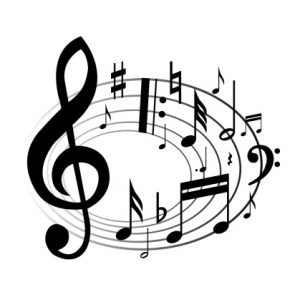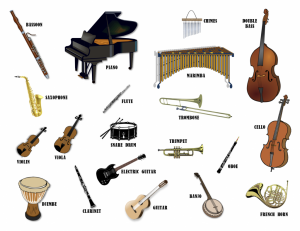Music

What does music provide the children at PTM?
Music is a unique way of communicating, that can inspire and motivate children. It is a vehicle for personal expression, and can play an important part in the personal development of people. Music at Pear Tree Mead Academy reflects the culture and society we live in, so the teaching and learning of music enables children to better understand the world they live in and plays an important part in helping children feel part of a community. Besides being a creative and enjoyable activity, music can also be a highly academic and demanding subject. We provide opportunities for all children to create, play, perform and enjoy music, to develop the skills, to appreciate a wide variety of musical forms, and to begin to make judgements about the quality of music.
The objectives of teaching music in our school are to enable children to:
- know and understand how sounds are made and then organised into musical structures;
- know how music is made through a variety of instruments;
- know how music is composed and recorded;
- know how music is influenced by the time, place and purpose for which it was written;
- develop the interrelated skills of performing, composing and appreciating music.
- To develop confidence when performing both in class and to a wider audience.
What learning opportunities are given to the children?
Currently we have a Rock Band for children aged 4 to 11 years and year 5 children receive a term of free ukulele lessons. This is in addition to the normal music teaching of the school. Interactive workshops are also purchased throughout the year to support the children’s learning.
Our school choir attend Young Voices at the O2 each year, which helps to assist with our mission to provide a musical experience for children that will inspire a love of music that they will remember for the rest of their lives.
How is the subject ‘implemented’ and taught?
At Pear Tree Mead Academy we make music an enjoyable learning experience. We encourage children to participate in a variety of musical experiences through which we aim to build up the confidence of all children. Singing lies at the heart of good music teaching. Our teaching focuses on developing the children’s ability to sing in tune and with other people. Through singing songs, children learn about the structure and organisation of music. We teach them to listen to and appreciate different forms of music. As children get older, we expect them to maintain their concentration for longer, and to listen to more extended pieces of music. Children develop descriptive skills in music lessons when learning about how music can represent feelings and emotions. We teach them the disciplined skills of recognising pulse and pitch. These are often taught together. Children are also taught to make music together, to understand musical notation, and to compose pieces.
We recognise that in all classes children have a wide range of musical ability, and so we seek to provide suitable learning opportunities for all children by matching the challenge of the task to the ability of the child. We achieve this in a variety of ways:
- setting tasks which are open-ended and can have a variety of responses;
- setting tasks of increasing difficulty (not all children complete all tasks);
- grouping children by ability in the room and setting different tasks to each ability group;
- providing resources of different complexity, depending on the ability of the child;
- using classroom assistants to support the work of individuals or groups of children.
The contribution of music to teaching in other curriculum areas
English
Music contributes significantly to the teaching of English in our school by actively promoting the skills of reading, writing, speaking and listening. Children develop their language skills through singing songs, with attention to diction, meaning, rhythm and rhyme. The children use reference books, and develop research skills, when finding out about the history of music and musicians. Music is also used to stimulate discussion or creative writing. Through working with others in a musical setting, children develop their ability to communicate ideas effectively.
Mathematics
The teaching of music contributes to children’s mathematical understanding in a variety of ways. Children who study the structure of music are observing patterns and processes. Talent in music is often linked with talent in mathematics, as the rhythm and structure of music is mathematically based.
Personal, social and health education (PSHE) and citizenship
Music contributes significantly to the teaching of personal, social and health education and citizenship. Through the common goal of making music, children learn to work effectively with other people, and to build up good relationships. Music is the basis of many social activities, and has an important role to play in the personal development of many young people. It has a vital role to play in building self-confidence. Participation in successful public musical performances is sometimes one of the most memorable things young people do at school.
Spiritual, moral, social and cultural development
Creating, performing or listening to music can sometimes be a moving and even spiritual experience. We encourage children to reflect on the important effect that music has on people’s moods, senses and quality of life. Children at Pear Tree Mead School have the opportunity to encounter music from many cultures and through their growing knowledge and understanding of the music; they develop more positive attitudes towards other cultures and societies.
ICT
Information and communication technology enhances the teaching of music, where appropriate, in all key stages. Children use computer programs to compose music. They also use ICT to enhance their research skills, whether through the Internet or on CD-ROMs. They listen to music on the Internet, and they record their own compositions to send to other schools electronically. They might experiment with editing voice recordings, which involves the use of a digital sound recorder. Children also use ICT to improve the presentation of their work.
How is the subject assessed?
Charanga has an easy-to-use framework that is really useful for both music specialists and non-specialists.
In essence, there are 3 aspects to assessment support:
- End of Key Stage Expectations with the expected musical learning against which to assess
- One-page lesson plans with the facility for teachers to formatively (continuously) assess
- A digital evidence storage facility to help you build a musical E profile for classes and individual pupils
With Assessment Logs and Cultural and Personal Development Logs, the whole Charanga framework is flexible and over time, will encourage children to take responsibility for their own musical learning with ever more exciting outcomes.
How do we overcome PTM learning barriers in this subject?
As a school we have identified the barriers to learning that our children encounter. We have introduced the ‘Growth Mind Set Tree’ that supports our children in resilience, aspiration and self-belief.
We have introduced the ‘Zones of Regulation’ to support emotional awareness, whilst continuing to give experiences of the wider world (where possible), outdoor exposure, including parents in their children’s learning and developing skills for future life.

What is briefly taught in each key stage?
The Early Years Foundation Stage
We teach music in the Early Years as an integral part of the experience work covered during the year. As the Nursery and Reception classes are part of the Foundation Stage of the National Curriculum, we relate the musical aspects of the children’s work to the objectives set out in the Early Learning Goals (ELGs) which underpin the curriculum planning for children aged three to five. Music contributes to a child’s personal and social development. Counting songs foster a child’s mathematical ability, and songs from different cultures increase a child’s knowledge and understanding of the world.
In Key Stage 1
Pupils should be taught to:
- use their voices expressively and creatively by singing songs and speaking chants and rhymes
- play tuned and untuned instruments musically
- listen with concentration and understanding to a range of high-quality live and recorded music
- Experiment with, create, select and combine sounds using the interrelated dimensions of music.
In Key Stage 2
Pupils should be taught to:
- play and perform in solo and ensemble contexts, using their voices and playing musical instruments with increasing accuracy, fluency, control and expression
- improvise and compose music for a range of purposes using the interrelated dimensions of music
- listen with attention to detail and recall sounds with increasing aural memory
- use and understand staff and other musical notations
- appreciate and understand a wide range of high-quality live and recorded music drawn from different traditions and from great composers and musicians
- develop an understanding of the history of music.
How can parents assist with this subject?
Parents can assist with their child’s music development by listening to music from around the world, encouraging and supporting instrumental mastery. Encourage children to create and perform their own pieces.

Inclusions and SEND children
PTM is an inclusive school where we cater for children with diverse needs supporting then to access the curriculum and achieve personal goals.
Further Information
If you wish to find out more about the National Curriculum please follow the link to the Government website:-
